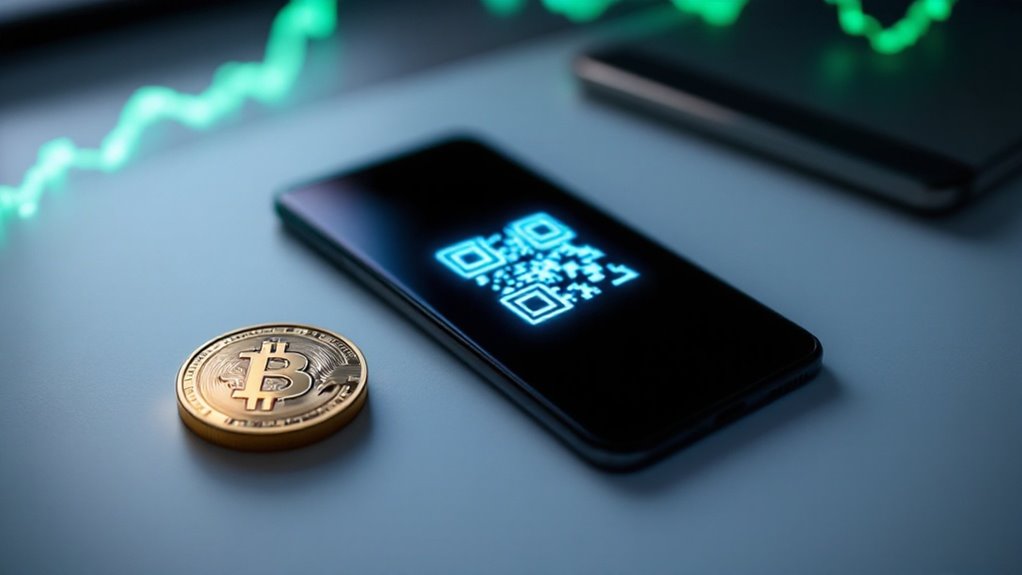Cryptocurrency payment systems represent a bold leap into digital commerce, allowing merchants to accept virtual currencies through specialized gateways. These systems process transactions 24/7 using blockchain technology, with fees often below 1% – a stark contrast to traditional credit cards. While price volatility and technical complexity pose challenges, the growing ecosystem of stable coins and increasing merchant adoption signals an evolving financial landscape. The future of money may look very different than we imagined.

As the digital economy continues to reshape how people exchange value, cryptocurrency payment systems have emerged as a revolutionary alternative to traditional financial infrastructure. Like digital bridges spanning the gap between old and new money, payment gateways serve as trusted intermediaries, enabling merchants to accept cryptocurrencies while offering the comfort of conversion to familiar fiat currencies.
These systems paint a striking contrast to the plodding pace of traditional banking. With approximately 650 million crypto owners worldwide, the adoption rate continues to surge exponentially. Payment systems maintain 24/7 operations without any downtime, ensuring constant availability. Where international wire transfers once crawled through a maze of correspondent banks, crypto payments zip across borders at lightning speed. The numbers tell a compelling story – transaction fees often hover below 1%, compared to the hefty 3-4% bite taken by credit card processors. For merchants watching their bottom line, the difference feels like switching from a gas-guzzling truck to an efficient hybrid.
Behind the scenes, providers like Coinbase Commerce, BitPay, and NOWPayments orchestrate a seamless dance of digital assets. When customers select cryptocurrency at checkout, QR codes materialize like digital doorways, inviting them to transfer funds with a simple scan. The blockchain validates each transaction with the precision of a master watchmaker, creating an immutable record that even the most determined fraudster cannot alter. Unlike traditional finance, these systems operate through decentralized services, eliminating the need for intermediary banks and financial institutions.
Yet, this brave new world of digital payments isn't without its thorns. Cryptocurrency prices swing like pendulums, making merchants nervous about value stability. The technology's complexity can leave less tech-savvy users feeling like they're trying to pilot a spaceship with a driver's license.
And while blockchain technology offers fort-like security, the irreversible nature of transactions means one wrong digit could send funds into the digital void.
Despite these challenges, the future of cryptocurrency payments pulses with potential. As more businesses embrace digital currencies and stable coins emerge to tame volatility, the ecosystem grows more robust by the day.
Traditional financial institutions, once skeptical, now peek over the fence with increasing curiosity. In this evolving landscape, cryptocurrency payment systems stand as pioneers, blazing trails toward a more inclusive and efficient financial future.
Frequently Asked Questions
How Can I Protect My Cryptocurrency Wallet From Hackers and Theft?
Protecting cryptocurrency wallets requires using cold storage hardware devices, enabling two-factor authentication, implementing complex passwords, avoiding phishing scams, and never sharing private keys. Regular security updates and encrypted backups further enhance protection.
Which Countries Have Banned or Restricted Cryptocurrency Payment Systems?
China, Algeria, Bangladesh, Egypt, and Morocco maintain full cryptocurrency bans. Several countries including Bolivia, India, Indonesia, Turkey, and Vietnam impose partial restrictions, primarily prohibiting crypto payments while allowing limited trading activities.
What Happens to My Crypto Payments if the Internet Goes Down?
During internet outages, pending crypto transactions pause but existing funds remain secure. While new payments cannot be broadcast, transactions can resume once connectivity returns. Offline methods like cold storage wallets provide backup payment options.
Can Cryptocurrency Transactions Be Reversed if I Make a Mistake?
Cryptocurrency transactions cannot be reversed once confirmed on the blockchain. Unlike traditional banking, there is no central authority to cancel or undo transactions. Users must verify details carefully before sending funds.
How Do Cryptocurrency Payment Fees Compare to Traditional Banking Fees?
Cryptocurrency transaction fees are generally lower than traditional banking fees, especially for international transfers. While crypto fees can vary with network congestion, they typically cost cents compared to banks' $25-50 wire fees.









